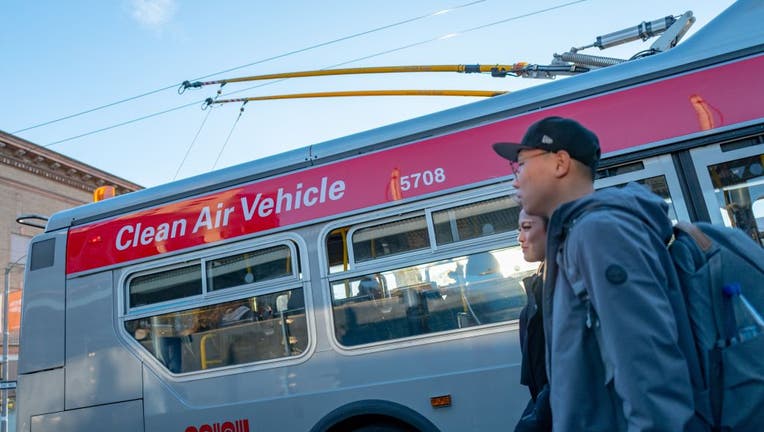California gets $184 million to reduce bus emissions

Low-angle view of two people walking through the Fillmore district in San Francisco, California, with electric bus visible in background, with text reading Clean Air Vehicle, March 7, 2020. (Photo by Smith Collection/Gado/Getty Images) (Getty Images)
WASHINGTON - California was given over $184 million in grants to support the state's transition to zero- and low-emission buses, Senators Alex Padilla and Dianne Feinstein announced on Monday.
The biggest grants are headed to Marin County and San Francisco's bus systems.
The funds come from Federal Transit Administration's programs that help transit agencies access new, cleaner vehicles. They also help agencies invest in related facilities such as recharging, refueling, and maintenance.
Marin County will get the largest block of money: $31,535,000 for the Marin County Transit District. The San Francisco Municipal Transportation Agency was awarded $30,128,378.
Other notable state grants include:
- $29,330,243 for the North Country Transit District
- $25,513,684 for the Alameda-Contra Costa Transit District
- $20,381,950 for the Santa Cruz Metropolitan Transit District
- $12,458,500 for the Solano County Transit
- $9,899,120 for the City of Santa Rosa
- $5,750,351 for the Golden Empire Transit District
- $3,609,800 for the City of Anaheim
"California has an established goal to transition the state’s entire transit bus fleet to zero-emission by 2040, and I’m thrilled the Department of Transportation has committed millions of dollars to help our state accomplish this," Feinstein said. "These grants will put more buses on our roads, help reduce pollution in our communities and address the ever-present threat of climate change."
SEE ALSO: Bay Area bridge tolls could go up to $8.50 if new legislation passes
Padilla gave a nod to the Bipartisan Infrastructure Law, which was responsible for increasing funding for both of the contributing grant programs.
"I am proud that the Bipartisan Infrastructure Law is making it possible for transit agencies to purchase cleaner buses and finally invest in the charging and maintenance facilities needed to make this transition possible," Padilla said. "I applaud these critical grants and I will continue leading the charge for investments that reduce air pollution and create healthier air for all our communities."

